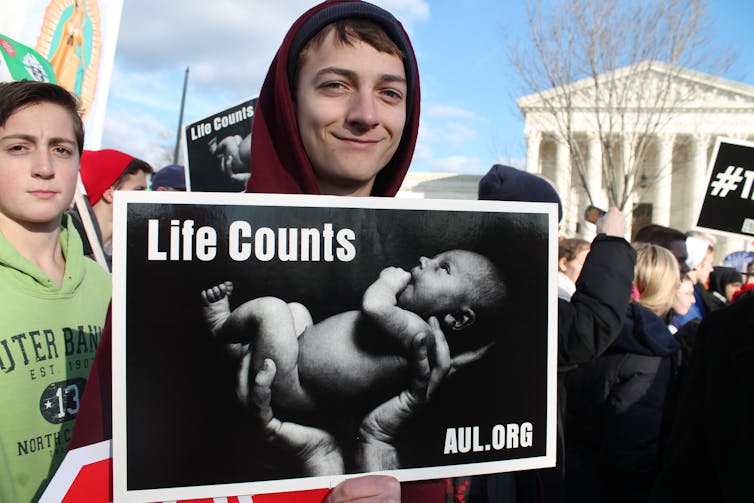New South Wales recently became the fifth Australian jurisdiction to enact legislation that establishes safe-access zones around abortion clinics.
The legislation is a response to picketing of clinics by anti-abortion protesters for more than two decades. These protesters characterise themselves as “sidewalk counsellors” but their conduct has included verbal abuse, threats, impeding entry to clinics, displaying violent imagery and acts of “disturbing theatre” such as pushing a blood-splattered doll in a pram.
Safe-access zones are sometimes called bubble zones because they create a bubble around an abortion clinic in which certain conduct is prohibited. NSW will now impose safe-access zones of 150 metres around clinics that provide abortions.
Safe-access zone laws enable the state to fulfil obligations to respect and protect human rights under international law. They also protect women from conduct that has been recognised as violence against women.
Similar zones operate in Tasmania, the ACT, the Northern Territory and Victoria.
Read more: State by state, 'safe access zones' around clinics are shielding women from abortion protesters
What does the NSW legislation look like?
The Public Health Amendment (Safe Access to Reproductive Health Clinic) Bill 2018 was introduced by Labor MP Penny Sharpe and co-sponsored by Nationals MP Trevor Khan. The NSW Parliament passed the law last Friday after Premier Gladys Berejiklian, who supported the bill, granted Liberal MPs a conscience vote.
The legislation prohibits conduct that includes interfering with any person accessing or leaving a clinic, filming without consent and communicating about abortions in a manner that is reasonably likely to cause anxiety or distress.
People who engage in prohibited conduct inside the zone may be fined up to A$5,000 and/or imprisoned for up to six months for a first offence. A subsequent offence can have them fined up to A$10,000 and/or imprisoned for up to 12 months.
Like NSW, the laws enacted in Tasmania and Victoria create safe-access zones of 150 metres around clinics. In the ACT, the health minister determines the radius of the zone but it must be at least 50 metres.
 Safe-access zones protect women from harassment by anti-abortion protesters.Elvert Barnes/Flickr, CC BY
Safe-access zones protect women from harassment by anti-abortion protesters.Elvert Barnes/Flickr, CC BYSimilar laws don’t operate in Queensland, South Australia or Western Australia. Queensland’s abortion laws (which only allow abortion when the continuation of the pregnancy poses a serious risk to a woman’s physical or mental health) are under review. The review will look at how the laws should be amended, as well as whether to include safe-access zones.
The NSW legislation does not decriminalise abortion. This remains in the NSW Crimes Act but is subject to exceptions on grounds of physical or mental health, with reference to economic or social factors. So it’s important to note that the safe-access laws are somewhat independent of the legality of abortion itself.
Read more: Explainer: is abortion legal in Australia?
High court challenges
The Victorian legislation has been challenged in the High Court by Kathleen Clubb, an active member of the anti-abortion group known as Helpers of God’s Precious Infants. Founded in the US, the group picketed the Fertility Control Clinic in East Melbourne for more than two decades and has been actively engaged in anti-abortion protests in Albury, NSW.
Last October, Clubb was convicted of communicating about abortions in a manner reasonably likely to cause anxiety or distress within the safe-access zone around the East Melbourne clinic. In her challenge to the legislation, Clubb has submitted that Victoria’s law infringes on freedom of political communication implied in the Commonwealth Constitution.
Tasmania’s safe-access zones are also the subject of a challenge brought on the same constitutional grounds. This one was brought by Graham Preston, a Queensland-based anti-abortion protester, who has been convicted of breaching the Tasmanian legislation.
These challenges have important ramifications for the NSW legislation. If the Tasmanian or Victorian laws are found to be constitutionally invalid, a challenge to the NSW legislation would yield a similar outcome.
Why are these laws important?
In her second reading speech, NSW MP Penny Sharpe said:
No person seeking lawful medical advice and care should be forced to run a gauntlet of abuse. Every person has the right to expect their government to protect them from being intimidated and harassed. We have an obligation to provide that protection…
Safe-access zones protect individuals from intrusions into privacy by strangers who seek to interfere in deeply personal decisions. They protect the rights to health-care services, the right of women to decide the number and spacing of their children, the right to security of person, as well as equality and freedom from cruel, inhuman and degrading treatment.
Read more: Some women feel grief after an abortion, but there's no evidence of serious mental health issues
The rights of patients and others who need access to clinics in which abortions are provided cannot be safeguarded while protesters retain a presence and attract a captive audience. Those who wish to vocalise their opposition to abortion remain free to do so, but at a distance that protects the rights of others.
Tania Penovic does not work for, consult, own shares in or receive funding from any company or organisation that would benefit from this article, and has disclosed no relevant affiliations beyond their academic appointment.
Authors: Tania Penovic, Senior Lecturer, Faculty of Law, Monash University
| < Prev | Next > |
|---|







